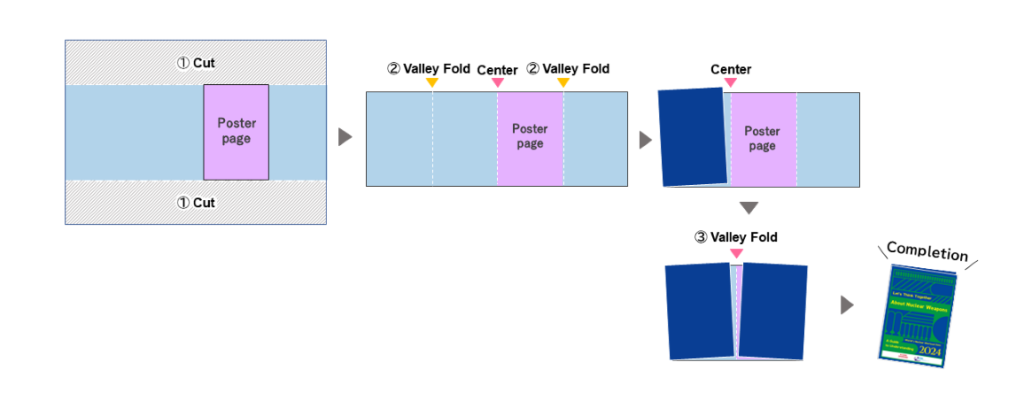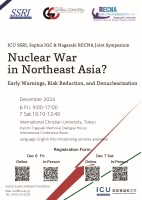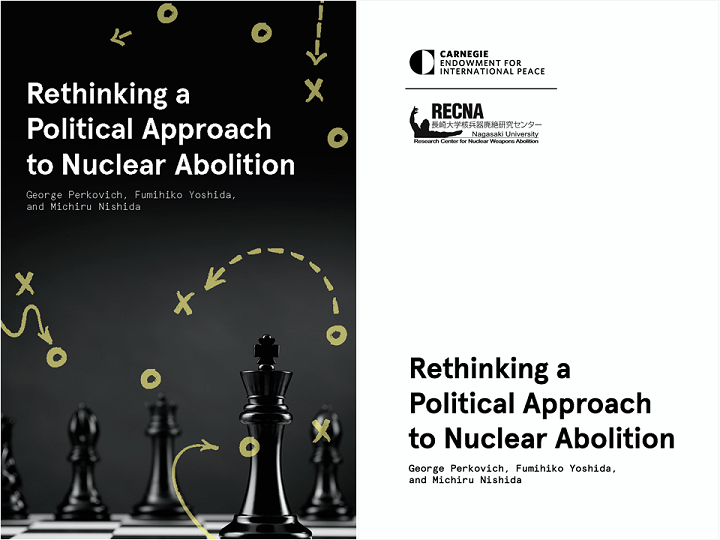 Rethinking a Political Approach to Nuclear Abolition
Rethinking a Political Approach to Nuclear Abolition
George Perkovich, Fumihiko Yoshida, Michiru Nishida
Published on March 27, 2025
RECNA has been collaborating with The Carnegie Endowment for International Peace (CEIP) for nearly two years. The research result is a digital book entitled “Rethinking a Political Approach to Nuclear Abolition”.
Rethinking a Political Approach to Nuclear Abolition【PDF】
≫ Carnegie Endowment for International Peace Website
Vol.7, Issue 2 of Journal for Peace and Nuclear Disarmament (J-PAND) is now available online. There are 17 open access articles.
For the issue, see here. This is the third and final special issue on “Irreversibility in Global Nuclear Politics,” which attempts to apply the concept of irreversibility to various disarmament practices.
Reflecting on the Significance of Nihon Hidankyo’s Nobel Peace Prize
Research Center for Nuclear Weapons Abolition, Nagasaki University (RECNA)
December 10, 2024
This afternoon in Oslo, the Japan Confederation of A- and H-Bomb Sufferers Organizations (Nihon Hidankyo) was awarded the Nobel Peace Prize. As a research institution based in Nagasaki, a city devastated by an atomic bomb, and dedicated to the abolition of nuclear weapons, RECNA extends its heartfelt congratulations to Nihon Hidankyo. While it is rare for “RECNA’s Eye” to feature personal opinions, in honor of this historic moment, Professor Kimiaki Kawai and Associate Professor Keiko Nakamura, both researchers with roots in the nuclear abolition movement, have written about the significance of this award.
***
The significance of the hibakusha’s lifelong efforts to tell the world “what happened under the mushroom cloud” goes beyond the nuclear weapons abolition movement. Although war is prohibited under international law and civilians are meant to be protected, many civilians are still falling victim to wars today in Ukraine and the Middle East. In the face of these realities, the hibakusha ask a crucial question, “Who suffers in war?” They urge us to consider the reality of the “attacked side” rather than focusing on the logic of the “attacking side.” They challenge us to move beyond the limits of security based on power and mistrust, and instead to pursue security rooted in empathy and solidarity.
The “power of transmission” inherent in the hibakusha’s testimonies questions the logic of the attacking side and serves as a driving force to build a world free of nuclear weapons and war. It is my mission, as someone who was involved in the nuclear weapons abolition movement and is now in academia, to inherit this energy and disseminate ideas about security based on empathy and solidarity from Nagasaki. This is where I see the meaning of the “power of transmission” for me. How will we, as the successors to the hibakusha, develop the power to transmit their legacy to people both within Japan and around the world? On this 80th anniversary of the atomic bombing, I hope we can contemplate this question together here in Nagasaki. — Kimiaki Kawai
***
What has stirred hearts around the world and inspired collective action is not solely the haunting accounts of “that day”—August 6 or 9—shared by hibakusha. It is the profound philosophy and unwavering resolve embodied in their lives. Their tireless plea, “Let no one else ever experience this,” delivered often at great personal sacrifice, has resonated deeply and universally, moving countless individuals to reflect and act.
The Founding Declaration of Nihon Hidankyo was issued in August 1956, 11 years after the atomic bombings. At that time, there was no formal support for any hibakusha from the Japanese government. Many hibakusha were grappling with severe physical and emotional scars, economic hardship, and pervasive discrimination and prejudice. The testimonies they left behind are heartrending, expressing not only anguish over their fates but, at times, envy for those who had perished in the bombings. Yet, even amidst such profound pain and inner conflict, hibakusha found the strength to rise. As their declaration boldly proclaimed, “We can no longer remain silent. Let us join hands and stand together.”
In the 68 years since, hibakusha have exemplified the remarkable capacity of humanity to transcend cycles of violence and hatred. This has never been an easy undertaking. Yet, in the face of daunting challenges, they refused to abandon hope. They empathized with the suffering of others, sought dialogue, and committed themselves to the pursuit of the common good. Their actions stand in stark contrast to a world increasingly defined by distrust and violence, offering a powerful reminder of humanity’s potential to overcome even the gravest of trials. In a time when conflict and bloodshed persist, we must once again draw inspiration from the enduring legacy of the hibakusha. — Keiko Nakamura
***
The journey of the hibakusha points the way toward building a new form of security based on empathy and solidarity. It is our responsibility as the next generation to carry on this path and pass it down both domestically and internationally. The awarding of the Nobel Peace Prize to Nihon Hidankyo provides an opportunity to reflect on this responsibility.
REC-PP-21
Anthony Dai
★ Full text of REC-PP-21 (PDF) is here.
★ List of RECNA Policy Papers is here.
Guide to Understanding “World’s Nuclear Warhead Data 2024”
In the 2024 edition of the “World’s Nuclear Warhead Data,” we have released a newly revamped “Explanatory Leaflet” and “Digital Guide.”
■Explanatory Leaflet(PDF)
⇒The “Explanatory Leaflet” offers a clear overview of the global nuclear weapons status, based on the 2024 “World’s Nuclear Warhead Data” poster.
■Digital Guide:Let’s Think Together About Nuclear Weapons
⇒ The world situation regarding nuclear weapons is explained in an easy-to-understand Q&A format.
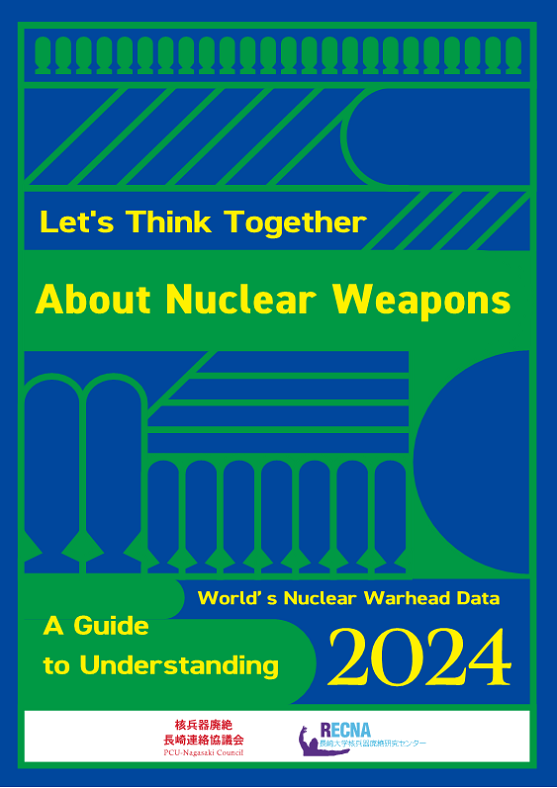
|
World’s Nuclear Warhead Data |
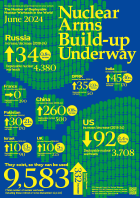
|
★ The poster is also available in English and Korean.Please click here .
★ You can see previous “World’s Nuclear Warhead Data” from [All Lists]
|
How to make a leaflet:
Print the leaflet PDF double-sided on A3 paper with ‘short-edge binding,’ trim the excess at the top and bottom, and fold it in a gatefold style.
|
>> Previous editions can be downloaded from here.
RECNA Newsletter Vol.13 No.1 (September 30, 2024)
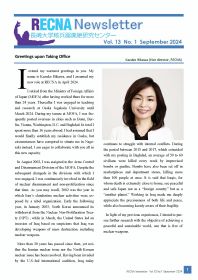
|
Greetings upon Taking Office — Kazuko Hikawa Publication of RECNA Policy Paper 20 Establishment of the Research Center for Global Risk Nagasaki Youth Delegation Visits Geneva Redesigning of the World’s Nuclear Warhead Data Poster The 3rd Essay Contest on a “Nuclear Weapons Free Future” Two New Visiting Professors Take Up Their Posts [Full text] * Citation URI: http://hdl.handle.net/10069/0002001654 |
ICU SSRI, Sophia IGC, RECNA Joint Symposium
Nuclear War in Northeast Asia?
Early Warnings, Risk Reduction, and Denuclearization”
Friday, December 6, 9:00-17:00 and
Saturday, December 7, 10:10-12:40 (JST)
■Program:
Fri. 6 December International Symposium
9:00-10:00 Opening Session
Welcome Greetings: Katsuhiko Mori, Director, SSRI, ICU
Keynote Speech: Morton Halperin via Zoom, former Director, Policy Planning Staff, US Department of State
“Towards a NWFZ in Northeast Asia”
10:10-11:20 Session I First Strike? The Rise of Preemptive Doctrines and the Rising Risk of War
Jae-Jung Suh, Program Chair, SSRI, ICU
“The Lure to Preempt Weapons, the Risk to Precipitate War”
Gregory Kulacki, East Asia Project Manager, Union of Concerned Scientists
“Contemporary US-China Relations and the Problem of Extended Nuclear Deterrence in East Asia”
Discussants: Wooksik Cheong, Director, Peace Network
Fumihiko Yoshida, Director, Research Center for Nuclear Weapons Abolition, Nagasaki University
11:30-12:40 Session II Risk Management and Reduction
Peter Hayes via Zoom, Director, Nautilus Institute for Security and Sustainability
“Comprehensive Security Roadmap to Denuclearize the Korean Peninsula”
Van Jackson via Zoom, Senior Lecturer, Victoria University of Wellington
“Peacemaking and Nuclear Precarity: Practical Solutions to Preventing World War III”
Discussants: Michiru Nishida, Professor, School of Global Humanities and Social Sciences, Nagasaki University
Brian Aycock, Assistant Professor by Special Appointment, SSRI, ICU
12:40-13:50 Lunch
13:50-15:00 Session III Proactive Diplomacy and Early Warnings
Sayo Saruta, Director,New Diplomacy Initiative
“Institutionalization of Multi-Truck Diplomacy”
A-Young Moon, Representative, PeaceMOMO
“Security as commons, civil space for conflict prevention and peace-building”
Discussants: Tobias Weiss, Associate Professor, Faculty of Global Studies, Sophia University
Keiko Nakamura, Associate Professor, RECNA, Nagasaki University
15:10-16:20 Session IV C3 Security Regime and Denuclearization
Tatsujiro Suzuki, Professor, RECNA, Nagasaki University & Jae-Jung Suh
“Proposing NWFZ 2.0 and C3 Regime”
Rebecca Johnson via Zoom, Founding Director, Acronym Institute
“Using the TPNW to reframe security and denuclearization dialogues and NWFZ strategies in Northeast Asia”
Discussants: Kimiaki Kawai, Vice Director, RECNA, Nagasaki University
Wilhelm Vosse, Chair, Department of Politic and International Studies, ICU
16:20-17:00 Closing Session
Wrap-up Statement: Hiromichi Umebayashi, Special Advisor, Peace Depot
Concluding Remarks: Hyang-Suk Kwon via Zoom, Deputy Director, Institute of Global Concern, Sophia University
Joint Prayer: Jeremiah Alberg, Acting Director, Religious Center, ICU and Father Juan Haidar, Professor, Faculty of
Theology, Sophia University
Sat. 7 December Peace-building Scenario Workshop
10:10-12:40 Discussion on policy implications (Open to the public)
Opening Remark: Michael Hamel-Green via Zoom, Emeritus Professor, Victoria University
“Successes in Regional Peace-Building, Challenges in Northeast Asia”
Peace-building Scenario
Moderators: Francis Daehoon Lee, Director, Trans-Education for Peace Institute of PeaceMOMO
Kazuko Hikawa, Vice Director, RECNA, Nagasaki University
Wrap-up Statement: Fumihiko Yoshida
Concluding Remarks: Jae-Jung Suh
Special Lecture
The nuclear challenge today and tomorrow: Approaching eight decades since nuclear weapons were used in war
■ Date: December 2, 2024 (Mon) 18:00 pm – 19:30 pm (JST)
■ Venue: Nagasaki Atomic Bomb Museum Hall (Nagasaki City)
■ Language: English (with simultaneous interpretation)
■ Speaker: Dan Smith, Director of the Stockholm International Peace Research Institute (SIPRI)
*Online participation is available (Zoom Webinar):
Please register from the here🔗. [Deadline: Nov. 28, 2024]
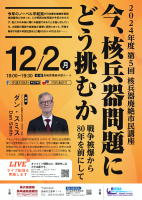 This year’s Nobel Peace Prize has been awarded to the Japan Confederation of A-and H-Bomb Sufferers Organizations. This award highlights that the issue of nuclear weapons concerns not only the present but also our future. In a world where tensions between major powers and nuclear arms race are intensifying, how should nations striving for peace and civil society respond?
This year’s Nobel Peace Prize has been awarded to the Japan Confederation of A-and H-Bomb Sufferers Organizations. This award highlights that the issue of nuclear weapons concerns not only the present but also our future. In a world where tensions between major powers and nuclear arms race are intensifying, how should nations striving for peace and civil society respond?
In this lecture, Mr. Dan Smith, Director of Stockholm International Peace Research Institute (SIPRI), will provide an insightful explanation of the challenges related to nuclear weapons and peace that the world currently faces, drawing upon his extensive experience and broad expertise.
Mr. Dan Smith has researched and written on security, conflict and peace for four decades. He served four years in the UN Peacebuilding Fund Advisory Group, two as Chair (2010–2011). He was part-time Professor of Peace and Conflict at the University of Manchester from 2014 to 2017. Before taking up his post at SIPRI, he was Secretary General of the London-based peacebuilding NGO, International Alert (2003–2015) and Director of the International Peace Research Institute, Oslo (1993–2001).
SIPRI is one of the world’s leading think tanks on peace and security and publishes an annual report on global armaments, military budgets and conflict situations. In that report this year, Director Smith expressed his concern that we are now in one of the most dangerous periods in human history.
■Hosted by PCU-NC Administration Office
■Co-hosted by Research Center for Nuclear Weapons Abolition, Nagasaki University (RECNA)
■Contact: PCU-NC Administration Office
Email:pcu_nc★ml.nagasaki-u.ac.jp (Change ★ to @.)
International Symposium2024
Victims of Nuclear Weapons in Global Contexts: Appealing- “No More Hibakusha” Now ▶[JPN]
On Saturday, November 30, 2024, The international symposium will be held co-hosted by the Hiroshima Peace Institute (HPI), The Hiroshima Peace Media Center, and RECNA.
[Interpretation Provided]
The Chugoku Shimbun
The Research Center for Nuclear Weapons Abolition (RECNA), Nagasaki University
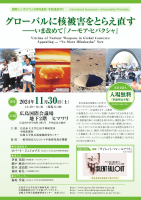 ■Outline:
■Outline:
This year marks the seventieth anniversary of the Lucky Dragon incident after the Bravo H-Bomb Test at Bikini Atoll, which resulted in another human death caused by nuclear weapons after Hiroshima and Nagasaki. This year’s Academy Award winning movie “Oppenheimer” also brought attention towards the Trinity test, which was the first nuclear explosion in human history. The consecutive nuclear testing since the Cold War era by nuclear weapons states knowingly caused calamity through radioactive contaminations, making so-called “Global Hibakusha” victims. This symposium will critically question the proposition that nuclear weapons bear some utility and try to establish ways to strengthen the norm against nuclear weapons use, be it during the wartime or peacetime. Putting narratives of Hiroshima and Global Hibakusha in the same context will help us to find a path towards nuclear abolishment.
Words of Congratulations on the Prize
For many years, Nihon Hidankyo has persistently called for the abolition of nuclear weapons based on the experiences of the hibakusha. Its activities have helped to raise awareness regarding the inhumanity of nuclear weapons around the world and contributed greatly to the realization of the Treaty on the Prohibition of Nuclear Weapons. This recognition of its efforts will surely provide a ray of hope for all those who are working towards a world without nuclear weapons. Today, where the threat of nuclear weapons use is mounting, we must deeply reflect on the significance of Nihon Hidankyo’s message: “Humanity must never again inflict nor suffer the sacrifice and torture we have experienced.” 1
As a research institute in Japan with the phrase “nuclear weapons abolition” in its name, all of us at RECNA would like to express our heartfelt congratulations upon the conferment of the Nobel Peace Prize to Nihon Hidankyo.
1 https://www.ne.jp/asahi/hidankyo/nihon/english/about/about1-02.html.
